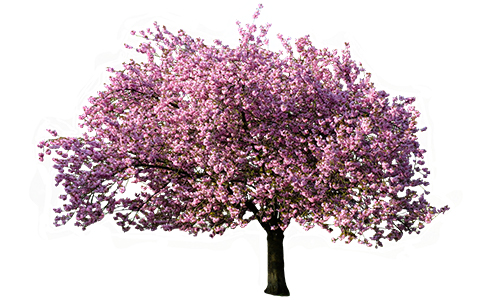
Prevent overcrowding and killing your smaller yard with overstory trees. Knowing which trees remain small through maturity will help you create a balanced, long-lived ecosystem for your landscape.
72tree.com assembled the following 9 tree species selections and information to help you select trees that match the size of your landscape and leave room for their roots to properly develop.
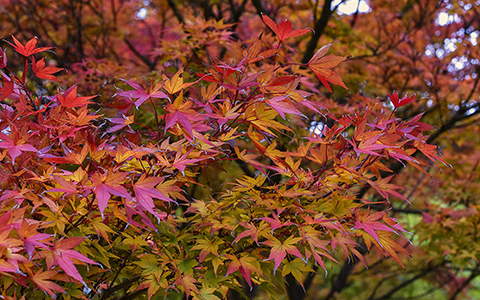
Few trees show off their splendor like the Japanese maple in its fall colors. There are numerous ways to use this little tree in your yard. You can plant it as a specimen tree (in a partly shaded spot) or use it as a shade or privacy tree along your property line.
Scientific Name – Acer palmatum
USDA Hardiness Zone – 5 – 8
Soil Requirements – moist, well-drained soil
Optimal Sun Exposure – Full sun to part shade
Color Varieties – burgundy foliage turning red in fall
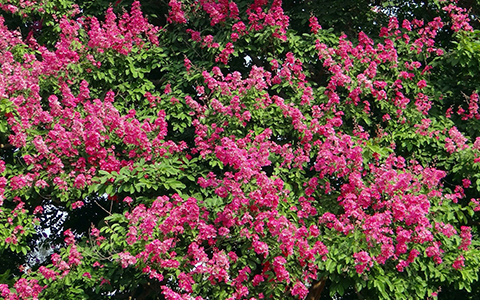
Crepe myrtle species are a favorite among southern gardeners and roadway landscapers. (Crepe myrtle is the preferred name in the south). The draw for this plant is that it blooms at a time when most trees are not blooming. Healthy trees will be covered with blooms that last for months during the hottest part of the summer.
Crepe myrtles are deciduous, grow quickly, and will often grow in their multi-stemmed form.
Scientific Name – Lagerstroemia indica
USDA Hardiness Zone – 7 – 9
Soil Requirements – Will grow in nearly all soil types
Optimal Sun Exposure – Full sun to part shade
Color Varieties – white, pink, red, lavender
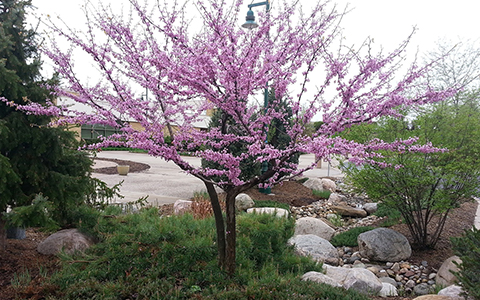
Desired for its striking pink or white flower display in spring, redbud is an easy-to-care-for small tree with heart-shaped leaves that turn golden-yellow in fall.
Scientific Name – Cercis canadensis
USDA Hardiness Zone – 5 – 9
Soil Requirements – requires well-drained soil
Optimal Sun Exposure – Full sun to part shade
Color Varieties – species ranges from golden-yellow and purple foliage and white to pink flowers
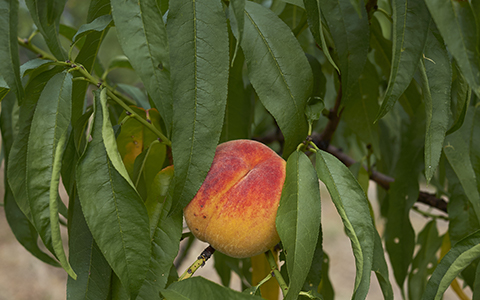
The Bonfire Flowering Peach tree is a small ornamental tree with a bold personality. This tree is undeniable when its branches are peppered with fragrant pink blossoms in the spring!” Once the flowers fade, large burgundy, drooping leaves grow in, stealing the show. You won’t get edible peaches from this species, but you will get a fragrant and impressive display of flowers and foliage that will meet your need for drama in the landscape!
Scientific Name – Prunus persica ‘Bonfire’
USDA Hardiness Zone – 5 – 8
Soil Requirements – Prefers moist, acidic soils
Optimal Sun Exposure – Full sun exposure
Color Varieties – dark red leaves and double pink-red flowers
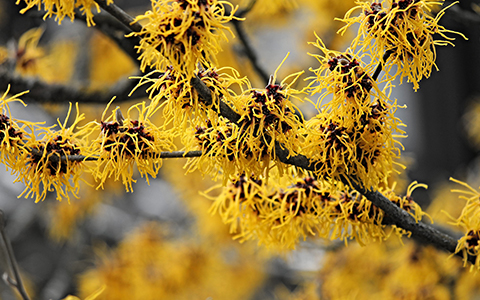
Witch hazel trees have highly desirable shaggy, citrus-scented blossoms in a rich yellow, orange, and red shades. Some species bloom in late winter before the leaves open, and others show off in the fall. These are small trees, averaging 10 to 20 feet tall, and are low maintenance. Prune in the early spring if you need to remove damaged portions or shape the plant.
Scientific Name – Hamamelis
USDA Hardiness Zone – 3 – 8
Soil Requirements – Average or medium moisture and well-draining
Optimal Sun Exposure – Full sun to part shade
Color Varieties – Orange, red, and yellow
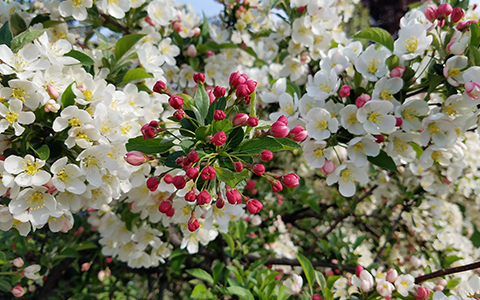
Plant a colorful display to your landscape with crabapples. There’s a wide range of species available that bear white, pink, and/or flowers. The ‘Prairifire’ species has dark pink flowers, reddish-purple foliage, and is disease resistant. The ‘Centurion’ variety has pink flowers, an upright shape, and great disease resistance. Crabapples are known for producing orange, gold, red, or burgundy fruit.
Scientific Name – Malus
USDA Hardiness Zone – 4 – 8
Soil Requirements – medium moisture, well-drained soil
Optimal Sun Exposure – Full sun exposure
Color Varieties – Flowers in shades of white, pink, and red with orange, gold, red, or burgundy fruit
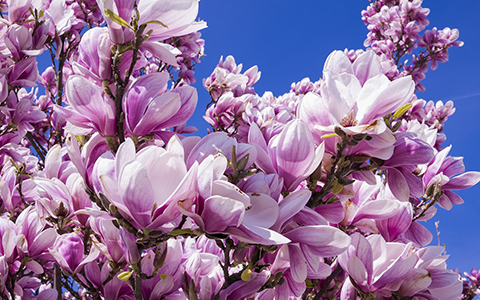
If you had space for one flowering tree to plant in your tiny yard, you may find some difficulty choosing, but Magnolia ‘Randy’ would be an excellent one. The beauty of this Magnolia was famously developed as part of the little girl series of hybrid Magnolias developed by the National Arboretum. All bred to be small deciduous low-branched trees growing only to 15 feet tall with oval habits and later spring blooming. ‘Randy’ will give you reddish-purple flowers on the outside and white on the inside. Then there’s the star-shaped flower that might pop up randomly in the middle of the summer for a second bloom.
This species is part of the Little Girl series (‘Ann,’ ‘Betty,’ ‘Jane,’ ‘Judy,’ ‘Pinkie,’ ‘Randy,’ ‘Ricki,’ and ‘Susan’) of hybrid magnolias developed at the National Arboretum in the mid-1950s by Francis DeVos and William Kosar.
Scientific Name – Magnolia ‘Randy’
USDA Hardiness Zone – 4 – 8
Soil Requirements – organically rich, neutral to slightly acidic
Optimal Sun Exposure – Full sun to part shade
Color Varieties – Dark Pink Blooms and green foliage
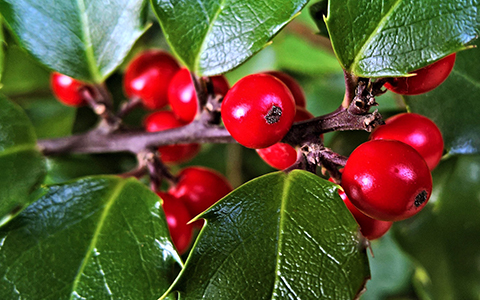
Multiple holly species, cultivars, and varieties could be selected for a small space, but the Dragon Lady Holly is an excellent choice for a few reasons. It is widely available, where other dwarf cultivars or uncommon varieties may require special ordering. The Dragon Lady cultivar is a female plant that needs a male for pollination to produce berries. Finally, its conical form requires very little maintenance, and it only grows to heights of about 15 feet or so. If you want a holly in your small space, this species makes sense.
Scientific Name – Ilex aquipernyi
USDA Hardiness Zone – 6 – 8
Soil Requirements – Acidic, moist, well-drained soils
Optimal Sun Exposure – Full sun exposure
Color Varieties – Green with Bright Red Berries
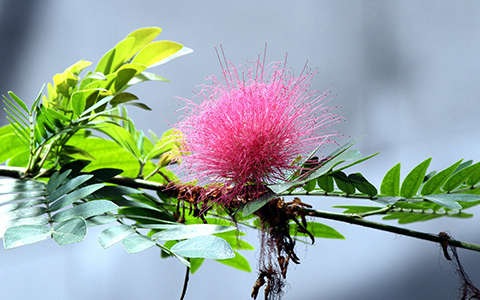
Whether growing it as a large shrub or prune it into a small tree, powder puff will treat you with its fluffy and fragrant red, pink, or white summer flowers. It’s a heat-loving, drought-resistant variety specialized for the warmest areas of California, Texas, and Florida.
Scientific Name – Calliandra haematocephala
USDA Hardiness Zone – 9 – 11
Soil Requirements – Moist, well-drained, fertile soil
Optimal Sun Exposure – Full sun exposure
Color Varieties – red, pink, or white flowers
In this article, you discovered 9 tree species for small landscapes that help you avoid overcrowding and root competition.
Planting appropriately sized trees for your tiny yard allows you to develop a hardy and healthy ecosystem for your plants, trees, and shrubs without any of them choking out the other.
When you plant trees that end up dwarfing other plant life, you are robbing your landscape of vitally needed sunlight, soil nutrition, and physical space for all your plants, shrubs, and trees to flourish.
Sources:
extension.unh.edu/blog/how-should-i-plant-and-care-japanese-maple
plants.ces.ncsu.edu/plants/lagerstroemia-indica/
selectree.calpoly.edu/tree-detail/calliandra-haematocephala
plants.ces.ncsu.edu/plants/ilex-x-aquipernyi/
landscapeplants.oregonstate.edu/plants/magnolia-randy
web.extension.illinois.edu/treeselector/detail_plant.cfm?PlantID=195
courses.missouristate.edu/pbtrewatha/Bonfire_Flowering_Peach.htm
uky.edu/hort/Common-Witchhazel